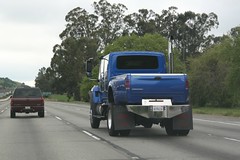 Image by ^Berd via Flickr
Image by ^Berd via Flickr
Will Americans Really Embrace Smaller Cars? by Brenda Williams
Global warming is a fact of life that is alarming the scientific community today. They worry that this warming will change the patterns of tropical and monsoon rains, melt glaciers and ice caps, cause droughts and floods, and create deserts.
Scientists also worry about acid rain and air pollution. Emissions from vehicles are partially responsible for the ingredients in the air that contribute to global warming, acid rain, and air pollution.
Environmentalists have long been pressuring for solutions to these problems. Least popular have been more use of public transportation, cycling and walking. Other more acceptable ideas are alternative fuel vehicles and smaller vehicles. But how successful will these be?
If vacuum cleaners or chain saws were sources of pollution and smaller versions or alternative power were suggested, people would probably convert without a second thought. But a car is a different matter. A vacuum cleaner's sole purpose is to remove dirt from various surfaces. Then it would naturally follow that a car exists primarily to transport people from point A to point B. Not so. A car occupies a position in the lives of its owners unequal to any other tool they might possess.
To begin with, vehicles are status symbols and luxury automobiles are synonymous with wealth. But it even goes deeper than that. As far back as 1964 Marshall McLuhan in "Understanding Media: The Extensions of Man" wrote..."The car has become an article of dress without which we feel uncertain, unclad and incomplete in the urban compound." No doubt many people who walk, bike or use public transportation to commute to work would be appalled at this statement and argue that in no way do they feel naked without a car. Nevertheless, there is considerable scientific research documenting the fact that people do have an attachment to their automobile different from that of any other inanimate tool they may own.
Research studies conducted at the University of Colorado at Boulder and at Vanderbilt University concluded that people use the same area of their brain to recognize their cars as they use to recognize faces. However, this area is not used to identify other inanimate objects.
Researchers at the University of Vienna discovered that people associate a human or animal face with automobiles. They also identify different automobiles with emotions such as anger, arrogance, and dominance.
While musicians haven't recorded odes to vacuum cleaners, that isn't the case with vehicles. The Beach Boys sang, "And she'll have fun, fun, fun til her daddy takes the t-bird away." Country music popularized the "truck driving man" and there was the guy with the "hot rod Ford and a two dollar bill."
So what are the implications for a move to smaller cars? Americans have long loved power and speed in automobiles. The higher the speed and the faster a car can accelerate from 0 to 60, the more it is adored. Americans are also aficionados of large, luxury cars. Real men drove T-Birds, Eldorados and Firebirds. All of these are high on fuel consumption or 'gas hogs.' So the question is, in spite of escalating fuel prices and the pressure of environmentalists, will 'real men' or 'real women' drive small electric powered cars?
Article Source: http://EzineArticles.com/?expert=Brenda_Williams
http://EzineArticles.com/?Will-Americans-Really-Embrace-Smaller-Cars?&id=1974332![Reblog this post [with Zemanta]](http://img.zemanta.com/reblog_e.png?x-id=ee9be9b4-4bf4-4e2d-ab53-dc672b35b199)
No comments:
Post a Comment